|
WHERE TO GO, HOW TO BOOK: Oliver! The Musical by Lionel Bart Jigsaw Stage Productions 4-7 April, 7.30pm, plus 2.30pm matinee on Saturday The Beacon, Portway, Wantage, OX12 9BX and 26-28 April 2018, 7.45pm, plus 2.30pm matinee on Saturday Cornerstone Arts Centre, 25 Station Road, Didcot, OX11 7NE TICKETS from www.beaconwantage.co.uk (4-7 April performances) www.cornerstone-arts.org (26-28 April performances) wegottickets.com/jigsaw (all performances) Brett's Pharmacy, Grove (all performances) Enquiries 01235 767509 Helena Kerswell plays Nancy, Bill Sikes' girlfriend, in this new production of Lionel Bart's hit musical Oliver! I catch her during rehearsals, less than two weeks before the show opens for its first four-night run at The Beacon in Wantage (there's a second run at Didcot's Cornerstone Arts Centre later in April). I ask her what the part of Nancy has going for it. 'She's got some good songs...' Helena pauses, '...and she gets murdered. It's my first time being killed on stage. Looking forward to that!' she laughs. Adults and children mill around the hall, preparing for a Sunday afternoon run-through of the whole show. Helena is already in her costume, ready to start. She's been doing musicals for several years now. After studying musical theatre at college, she spent some years working in the holiday entertainment business in the Mediterranean and back in England. But she decided to get 'a proper job', as she puts it, and now does musical theatre in her spare time. It's a story many amateur theatre performers will recognise. An ambition to act, sing or dance, which 'real life' frustrates, but you end up scratching that itch in amateur theatre. It's given am-dram some great performers. I ask Helena how the show is coming along. 'It's getting there. It takes a while when you're watching it. You think “have we actually got a show?” But last Sunday, when we did it on the stage, and you saw people in their costumes, all of a sudden, you see that it is coming together.' About half the cast are children. 'The kids are doing amazingly,' Helena continues. 'Oliver and Dodger, they've got a lot to learn, but they're doing really well. All the children are.' The show has an experienced captain at the wheel with director Gill Morgan having directed musicals for 20 years. The cast has two teams of children, a dozen in each, who alternate between shows, plus twelve adult actors. They are also using dancers from the Karen Brind School of Dance in Wantage. Gill regards that as a smaller cast and seems to take it in her stride. At this stage, there are still many things to sort out, but Gill gives every impression of being on top of it all. I recognise Edmund Bennett from a previous show with another theatre group, and sidle up to him. He has landed the role of Fagin, which he is delighted about. He tells me that he's wanted to play the part for quite a while now, and that he is now the right age to do so! 'Somebody involved in the last Jigsaw production said, “Oh, you know they're doing Oliver!, you should go for Fagin.”. So I went along to the audition.' He reckons that he got the part because all the other chaps were far too good-looking. I've seen Edmund act before, but how is he at singing? 'I've been taking lessons for this part, unusually. I have sung in pantomime and musicals before, but I wouldn't say I was a strong singer, but I can sing in tune. Some of the Fagin tunes are a bit challenging, because there's a lot of modulation, especially in Reviewing the Situation.' I saw Edmund sing You've Gotta Pick a Pocket or Two later in the afternoon, and the lessons had clearly paid off. Chris Palmer is far too nice to be playing violent villain Bill Sikes. 'It's a great part and it's a great play,' he tells me. 'I'm particularly enjoying playing a nasty piece of work. It's something to get your teeth into.' This is his second stage role for Jigsaw Stage Productions. His first was last year in Made in Dagenham in which he played multiple roles. In that show he spent, in his own description, a lot of time popping into the wings to change hats. With Oliver!, he's enjoying being able to focus on just one role. He got involved with Jigsaw through his daughter, who starred in their production of Annie two years ago. Chris was persuaded to work backstage. A couple of shows later and he was asked if he'd like an acting role. This time, director Gill Morgan asked him to play Sikes. Chris was delighted, but, he laughs, 'I don't know what that says about me!' I ask him why audiences should come and see the show. 'It's good fun, it's got a moral, it's a good story – one that's lasted many, many years through the strength of the storyline and the great characters in it, and it's excellent fun to watch.'
Oliver! opens on Wednesday 4 April 2018 at The Beacon in Wantage (booking details at top of this post). Photos copyright Mike Lord
0 Comments
THE ODYSSEY by Homer, adapted by Kerry Frampton and Ben Hales
HAMS Hagbourne Village Hall, East Hagbourne, nr. Didcot 21, 23 & 24 March 2018 If we are living in an age short on heroes, then there is no comfort to be found in Kerry Frampton's and Ben Hales' comic adaptation of Homer's The Odyssey. Odysseus himself never appears, except as a wooden spoon with a smiley face drawn on it. Not only is it a heroic tale with no hero, it is a mythological tale without any gods. Director Mary Hands highlights this in her programme notes. 'The gods do not feature in this play,' she explains. 'This is significant because the idea of gods controlling people's destiny, or helping them out or punishing them is such a feature of Ancient Greek stories. But not this version.' Frampton's and Hales' intention appears to have been to write a tale in which the idea of deities is deemed irrelevant and in which the notion of heroic men is deconstructed and gently mocked. The female characters, by contrast, are granted a quiet heroic status, and taken absolutely seriously without a whiff of parody. This happens most notably with Odysseus' wife Penelope (a fine, nuanced performance by Liz Holliss of a noble character) and Calypso (Maya Griffiths, convincing as a broken-hearted nymph). Instead of calling on gods and goddesses to help Odysseus and his men, the narrator (the Old Man of the Sea, of which more in a moment) announces a series of obstacles that the men had to overcome. This put me in mind of a self-help book, aimed at getting you to achieve your goals, which was probably not the writers' intention. The original production of this adaptation was written for three women who play all the roles. An enticing prospect for the three lucky women, but not ideal for an amateur theatre group with plenty of willing performers chomping at the bit. HAMS rather sensibly re-adapted the play so that 24 actors could play the 24 parts. They say that good things come in threes, and that was certainly true of HAMS' production, not once, but three times three. Our narrator, the Old Man of the Sea, is played simultaneously by three performers (Andy Stocks, Jemma Craperi and Becca Warrington), identically made up in grey knitted beards with matching beanies, and silver face paint, and talking to themselves ('Yes, myself,' 'Thank you, myself.'). This device worked well and represented the conscious use of a chorus in the Greek tradition. It was a structural and comedic success. Instead of Odysseus we had three of his warriors lead us through each adventurous episode. Their characters were written as bragging yobbos one moment, and abject cowards the next. If Frampton and Hales had spoken to even a couple of servicemen who had seen recent action in Iraq or Afghanistan, then perhaps we would have seen a fairer and more realistic picture of what real men feel in combat situations. As it was, this was mere caricature with, one suspects, a soft political purpose. I said good things came in threes. Notwithstanding my mixed feelings about the writing, we had terrific performances as the warriors from Kelly Stewart, Doug Amos and Martin Redhead. They were a thoroughly energised ensemble that proved to be the anchor of the show. They deserve congratulations. The final threesome that tickled me were Antiphantes, the Giant Chief, and his wife and daughter. Director Mary Hands had them played as reality TV celebs, being interviewed in front of the cameras about how they'd eaten members of Odysseus' crew. It was a comedy tour-de-force by Rob Dew, Jean Elliott and Jane Bell. Polyphemus the Cyclops was played as a sympathetic shepherd by David Cooke, whose costume consisted of a single giant eyeball that obscured the whole of his face. It worked to great comic effect and there was some nice interaction with the audience. His caring relationship with his flock of sheep (Di Duff, Vivien Stocks and Susan Proctor) made for some fine business, and further built up the audience's sympathy for him when he had his eye put out by Odysseus and his men. There were 'aaahs' as he limped off at the end. The fact that he'd provoked this by snacking on Odysseus' warriors seemed almost by the by. This was a production that lent itself to cameo performances, which the actors made the most of. Whether it was Craig Barfoot's Aeolius, King of the Winds, complete with Rod Stewart wig, or Karen Carey's sensuous and voluptuous mistress-cum-sorceress Circe, the hilarious quartet of Penelope's suitors (Yen Rickard, Di Duff, Iain Duff and John Lawson, playing up to the crowd), or Scylla and Charybdis (Muriel Stanley and Richard Elliott with very silly wig and litter pickers, and rubber ring respectively), the audience, and the present writer, enjoyed it enormously. Full marks for the decision to use a very spare set design, which consisted of a black backdrop with a washing line draped across it. From the line were hung banners announcing which aspect of Odysseus' character the current scene depicted. So we had Odysseus the Killer, Odysseus the Powerful Leader, Odysseus the Victim, etc. Flanking the backdrop were paintings of scenes from The Odyssey by Yen Rickard and the Pavilion Painters. There was intelligent use of mood music and songs, including an original song composed by Julian Gallop and Doug Amos, to enhance the drama. There were one or two moments where performers either forgot their lines or jumbled them. However, no prompts were required and those responsible dug themselves out and pushed forward. Phew! Mary Hands should feel quiet satisfaction at having taken something of a gamble over the choice of show and pulled it off. HAMS offered us an entertaining evening that was somewhat different from much amateur theatrical fare and sent their audience away chuckling. THE FARNDALE AVENUE HOUSING ESTATE TOWNSWOMEN'S GUILD DRAMATIC SOCIETY PRODUCTION OF A MURDER MYSTERY (MURDER AT CHECKMATE MANOR) by David McGillivray & Walter Zerlin Jr. ACTS (Aston and Cote Thespian Society) Aston Village Hall, Aston, Nr. Bampton, Oxon, OX18 2DU 8-10 March 2018 Murder at Checkmate Manor is a murder mystery evening put on by the fictitious Farndale Avenue Housing Estate Townswomen's Guild Dramatic Society. They're not very good. They miss their cues, they forget their lines, parts of the scenery fall apart, and they come out of character and talk to each other while on stage. Playing the fictitious am-dram society are the actors and actresses of the very real Aston and Cote Thespian Society (ACTS). They have a challenging time doing this, for sure. Messing up in rehearsal is something that all of us who tread the boards do with remarkable regularity when the director isn't asking us to, but deliberately playing something 'wrong', and making it look like a mistake, is surprisingly difficult. Add to this mix some really complicated business requiring split-second timing and an awareness of what other performers are doing and you have the potential for the 'mistake' being messed up and the joke being lost. Bit of a minefield then. I'm pleased to say that ACTS avoided stepping on any metaphorical explosives and turned in an ensemble performance that had pace (in spite of the deliberate awkward pauses) and a sense of fun. The audience, a full village hall, certainly enjoyed it. Playing a character who is playing another character requires a certain level of mental gymnastics from the actor. During my visit to their rehearsal last week, director Valerie Crowson told me that she had told the cast to play the murder mystery characters as members of the Farndale Avenue drama group, and not as members of ACTS. From what I saw last night, she succeeded in achieving that subtle difference from her cast. One of my favourite moments came in the second act when members of the cast had to move chairs around between scenes on stage. Each actor clearly had a different idea of where certain chairs were supposed to go, and so we had an extended (two minutes?), and very funny, sequence of seven performers taking off, moving or bringing back the chairs in question. With never a word exchanged. Beautifully choreographed and flawlessly executed by the cast. The laughter built as the layers of absurdity were piled on to the competitive chair shifting. Every actor's nightmare was cleverly presented in a scene between Daphne Bishop (Vicky Fuller) and Inspector O'Reilly (Mark Goss) in which their Farndale Avenue characters got stuck in a script loop, endlessly repeating the same short sequence of lines over and over, unable to remember what comes next. The cherry on the icing was when they swapped lines. Mark played 'Desmond Jones', a last-minute replacement, with an appropriate 'fish out of water' characterisation, non-plussed with the whole on-stage experience, which hit the spot. The show opened with 'Mrs Reece', the chairwoman of the Farndale Avenue society, introducing the play and making various 'housekeeping' announcements to the audience, before going on to play several roles in the murder mystery. Gill Long played this straight and seemed to inhabit the character of Mrs Reece with the right mix of pomposity and lack of self-awareness. The only moment the mask slipped, momentarily, was when the faintest of smiles flickered across Gill's face after delivering a line about moving towards the climax we've all been waiting for. This after her perfectly po-faced talk about the butler's tool. Jan West, who played 'Audrey' and Vicky Fuller, who played 'Thelma' pulled off some nice double acts as Lady Bishop and her daughter Daphne, and later as spinster aunt sisters, Violet and Rose Bishop, dressed in grotesque costumes. Overall, both Jan and Vicky got that 'worst possible am-dram' feel to their characters, with Jan's switching from being Lady Bishop to 'Audrey' particularly well done. Vicky gave us Daphne à la Joan Hunter-Dunn as played by clueless thesp Thelma. Netty Lings' Farndale Avenue character 'Felicity' as Pawn the butler (this was Checkmate Manor, after all) had the only true character arc in the play (not that we were expecting character development in a piece of this genre). She went from the only one on stage keeping things together in the first act to bored and distracted in the second. The latter mood swing was the basis of one of my favourite scenes in the show. Pawn the butler stood with a silver tray and discovered that she could reflect the stage lights on to the audience. Despite being told not to repeatedly by 'Gordon Pugh' playing Mr Goodbody the solicitor (Steve Neal), the butler persisted in acting like a naughty schoolboy. A great running gag. Another highlight was Laura Bradley's 'Gloria' as Regine the French maid, who was part of possibly the most ridiculous murder of the whole play (and there was stiff competition) – setting herself up for being pushed out of the window and then falling in slow motion, cartoon-like. One scene in which, uncharacteristically, things weren't quite as convincing as they could have been came early on. Some of the Farndale Avenue actors are supposed to start laughing on stage ('corpsing' in actorspeak). This didn't really work. The laughter lacked the spontaneity of the real thing and seemed stiff and unnatural. When an actor genuinely laughs on stage when he's not meant to, the audience quickly 'catch' the laugh and that didn't happen here.
Checkmate Manor is a comedy with elements of farce. The key to success is two-fold: making believable the idea that a character is playing another character...badly, and getting the timing of the physical comedy right. Valerie Crowson's direction achieved both aims successfully. Compliments also to those who built the set and props (much of which had to be collapsible) and to the backstage crew who were, it seems, kept as busy as the cast during the show. Photos courtesy of Valerie Crowson CONTINUING OUR SERIES OF INTERVIEWS WITH FIRST-TIME DIRECTORS IN OXFORDSHIRE In December 2016, after over twenty years in amateur theatre, I appeared in my first panto - Aladdin for Dorchester Amateur Dramatics Society (DADS). But I was not the only one doing a 'first'. Ann Winslet, another long-time performer, was making her debut as a director. It was a fun production to take part in, and one of the main reasons for that was having Ann at the helm. However, I wanted to find out a little bit more about her own experience in her new role, so we met over a coffee in Ann's home in Dorchester, which she shares with her husband and fellow DADS member Richard.
How did she come to be the director, I asked. 'Well I had my arm severely twisted, perhaps!' she laughed. 'No, in fact, I think they [DADS] were desperate to get people to come along and direct, and Rachel [Ann's daughter] and I said “we could give that a go, couldn't we?” and she got a play and I got the pantomime.' So had she had a long background in theatre – had she done much drama before? 'I've always done acting, right from school all the way through, on and off,' she tells me. After Ann and her family had moved to Oxfordshire, Rachel, who had already become a member of DADS, heard they were looking for a prompt and persuaded her mother to volunteer. So she prompted several plays for the group. After a while, someone suggested she turn to acting. The first show she performed in was 'Fiddler on the Roof'. She was in Australia on holiday at the time and received an email saying, 'we hear you're interested in doing it!' and she landed the role of Golda. 'I'm not a singer, but I did get the part, and it was lovely. I really enjoyed it. And I've been in and out since then.' First-time directors will often have a mentor. Was that the case here? 'Well, I was supposed to have a mentor, and the two weeks I was away on holiday, she filled in for me. Other than that, I think I asked her the odd thing. But I pretty much followed my own course.' Ann confided to me that she didn't initially have a vision for the play at the beginning of rehearsals, but she developed this as she went through. The whole directing thing presented quite a challenge. 'Never having done it before, I really struggled at the beginning. Not having a musical director, I had to find the music, the songs, and sort all that out. Russell, thank God, was brilliant as the pianist. So I had that all to do, and I had a hand in the costumes as well to begin with.' We talked about her working relationship with the cast. She was aware of her own lack of directing experience. 'I didn't want to appear bossy or unco-operative, and I wanted to be able to hear what they had to say, and maybe not take up every suggestion, but try if I could.' What were the most difficult aspects that she had to grapple with? 'We had to go over and over certain bits, particularly the sand dance towards the end, we really had to get to grips with that one. That was really tricky. It was good fun though.' The sand dance referred to was the classic fez and nightshirt routine made famous by Wilson, Keppel and Betty, that also incorporated a bit of stage magic too. It turned out to be the hit of the show, so the hours of hard work paid off. 'Getting a crew together was quite a challenge, because although the producer's supposed to do that, as the director, you've got to know that you can do it to start with, and getting the crew together is vital. I had a good crew, I was lucky I had a brilliant producer, Richard, if he's listening [Ann's husband Richard was out of earshot]! And that makes a huge difference. I'm not a singer and I'm not a dancer, but I had to choreograph everything as well, and although there wasn't that much, you have to put it all together. I was standing in my kitchen, putting bits together, thinking “will that work?” We got there in the end, but it was tricky. It was a challenge, but people have said it will go down in DADS history and, touch wood, I think it will.' At the end of the production, what did she get out of it? 'I was thrilled that I'd actually done it. Great satisfaction, really.' I asked Ann if she had any advice for budding directors. Her reply was forthright: 'Don't do it!!' she laughed. But then she revealed that she will, in fact, be directing the DADS Christmas show, The Slipper and the Rose, in November 2018. Any other tips? 'Look into it first, really go into it and realise what you're getting into, because it is not easy.' Maybe so, but the experience has taught Ann a lot, and I have a feeling that everyone will notice the difference with her second show. WHERE TO GO, HOW TO BOOK: The Farndale Avenue Housing Estate Townswomen's Guild Dramatic Society Production of a Murder Mystery (Murder at Checkmate Manor) by David McGillivray & Walter Zerlin Jnr. ACTS (Aston and Cote Thespian Society) 8, 9 & 10 March 2018, 7.30pm Aston Village Hall, Aston, Nr. Bampton, Oxon, OX18 2DU TICKETS from Aston Stores or via email from Popps Hoskins: Hoskinsnick at aol.com (£7 for Thursday, £8 for Friday & Saturday performances) 'It's hilarious! It's a really, really funny play. And also there's a lot that happens on the stage that adds to the hilarity of it. I was pleasantly surprised. From reading it through to actually doing it, it's very funny.' Vicky Fuller started performing for Aston and Cote Thespian Society (ACTS) at the age of 16. She was the back-end of a pantomime horse. Now a grown-up mum she gets major roles in the annual plays put on in Aston Village Hall. The play that she's chatting to me about, as rehearsals begin, has a very long title, but don't let that put you off from coming to see it. It runs for three evenings from Thursday 8th to Saturday 10th March 2018 inclusive. I speak to the director Valerie Crowson who explains the basic plot. 'Murder at Checkmate Manor' is a murder mystery evening put on by a fictitious am-dram group (the Farndale Avenue Housing Estate Townswomen's Guild Dramatic Society - FAHETGDS), who are not terribly good, and things do not go as planned. In fact, they end up going disastrously. Furthermore, each member of the fictitious FAHETGDS plays several roles in the murder mystery evening, leading to general chaos. So - each cast member of ACTS is playing a character who in turn is playing multiple parts. Hasn't that been fiendishly difficult to learn? Jan West, another ACTS performer, describes it as 'quite challenging'. There are many costume changes and further complications with dialect. 'We are supposed to have bad Northern accents, which we forget sometimes,' she says. And there's plenty of cleverly comic wordplay. 'Sentences are twisted round and spoken the wrong way and then they correct themselves.' Plus, I'm told, other monkeying around with lines that has had the cast laughing through rehearsals. Jan and Vicky are about to change into their costumes for the rehearsal. In this scene they are playing 'Audrey' and 'Thelma' playing the two spinster sisters Violet and Rose Bishop in what has been dubbed 'the wheelchair scene'. Jan chuckles: 'We're going to look hideous in what we're about to put on.' She promptly dons a purple wig to prove the point.
Director Valerie has taken the unusual step of listing the off-stage crew, including the props, costume, lighting and sound people, directly with the cast in the programme, because in this production they play such a crucial and continuous role with timing being critical. Valerie tells me that ACTS has acquired a big following from outside the village of Aston (near Bampton) from two main sources – the Oxfordshire Drama Network (the umbrella organisation for amateur theatre societies in the county), and through word-of-mouth recommendations. I stay and watch part of the rehearsal and leave with a broad grin on my face. I shall be back next week to see the finished performance. You can read my review on this blog then. |
About the Author
Mike Lord has been involved with amateur theatre for over twenty years, mainly as an actor but also, more recently, as a director. Archives
July 2019
Contact me
Please use the Contact Form for anything apart from comments on blog posts. |
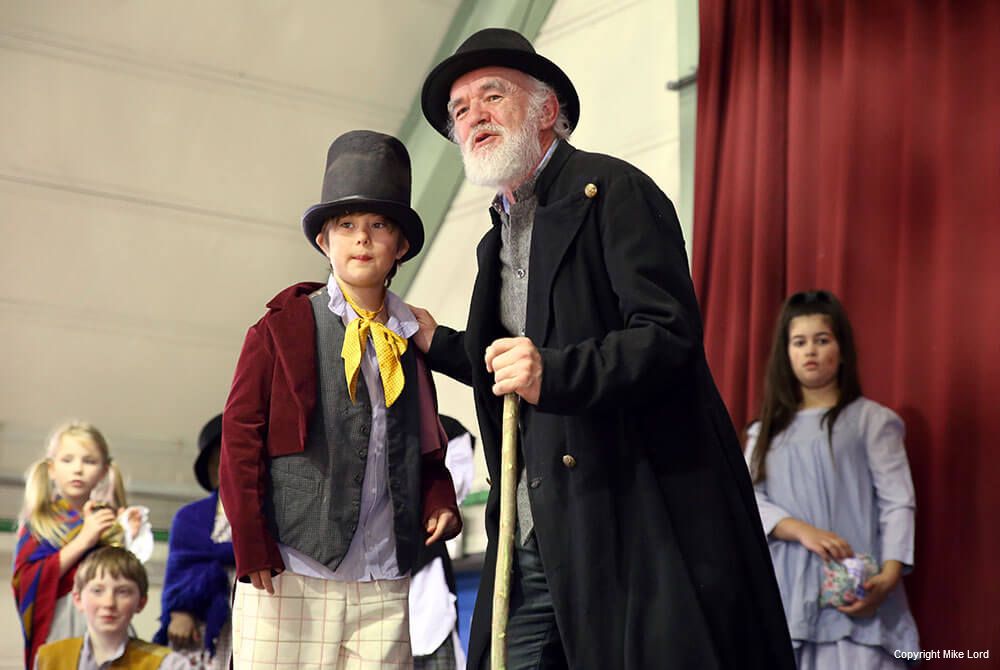
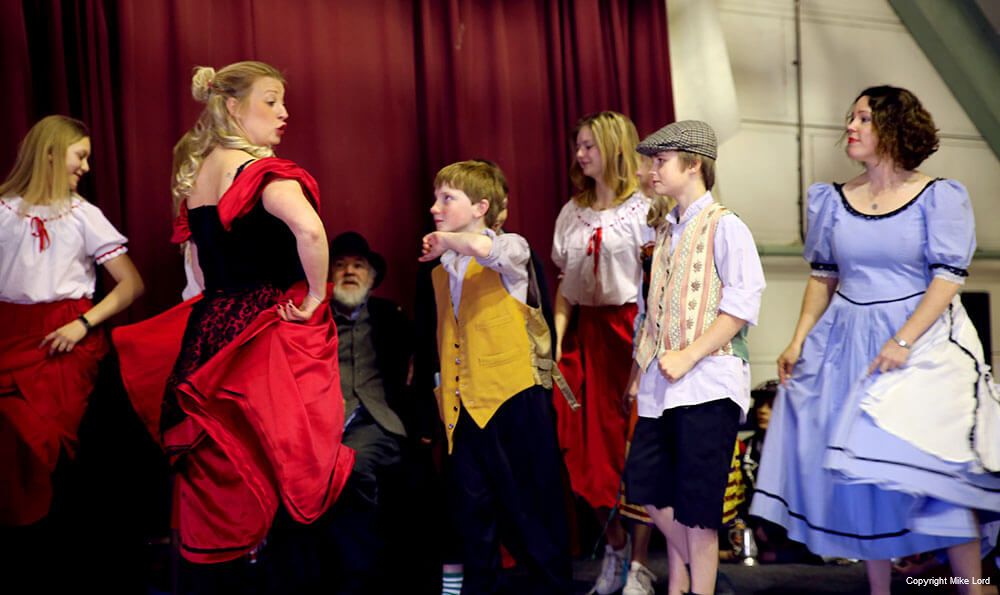
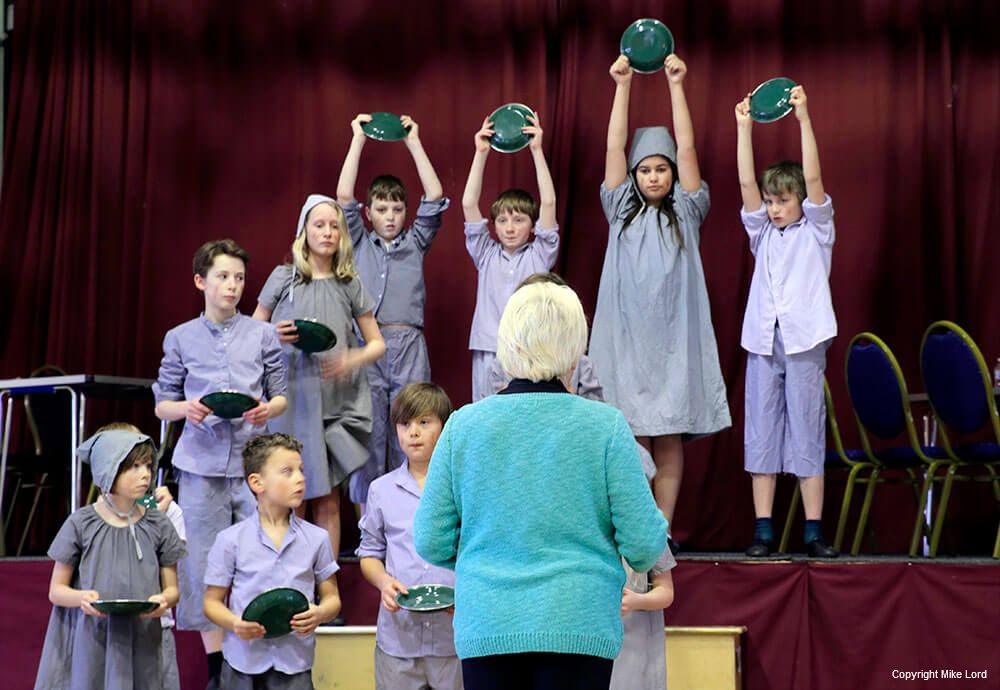
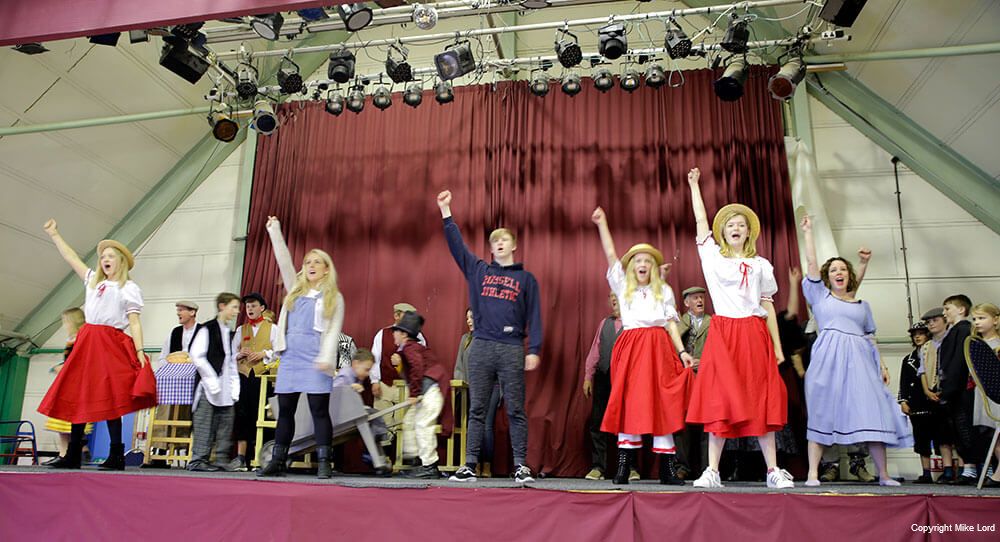
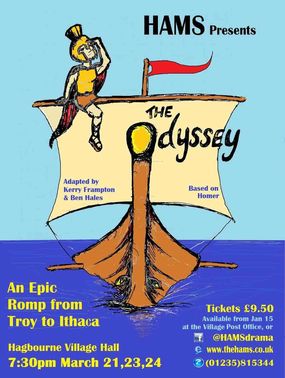
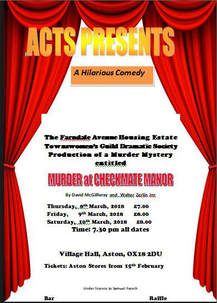
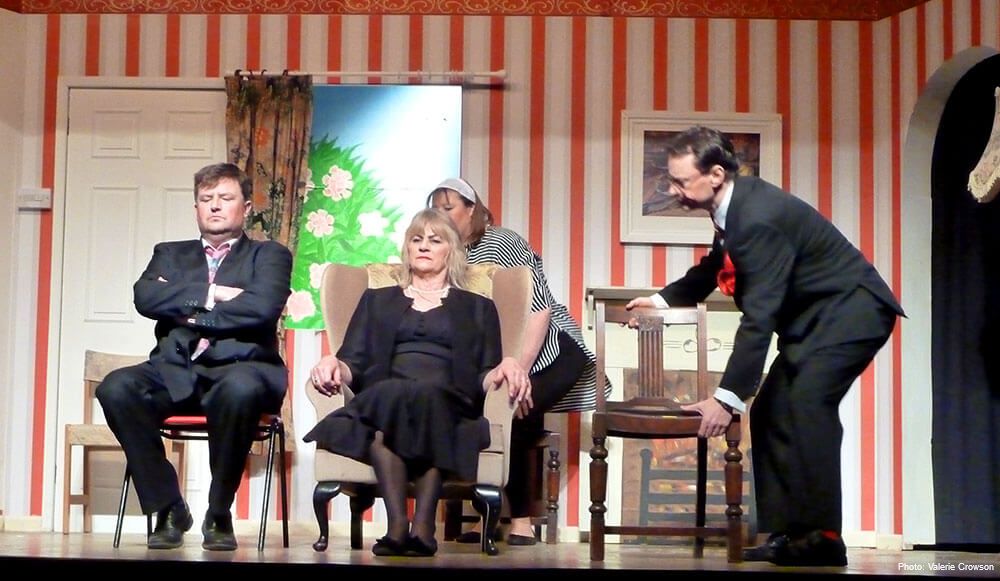
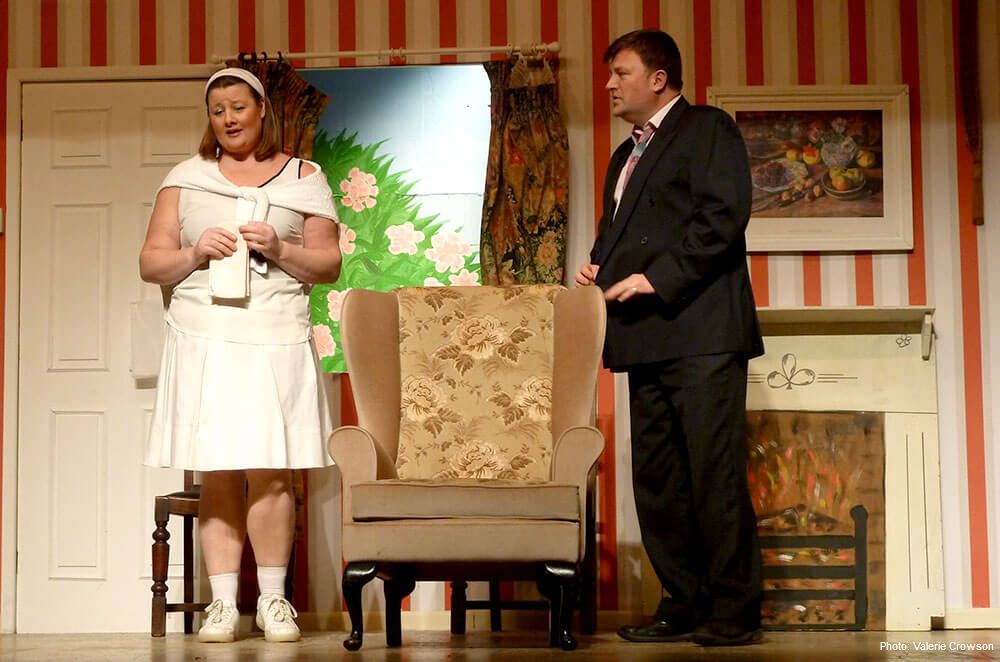
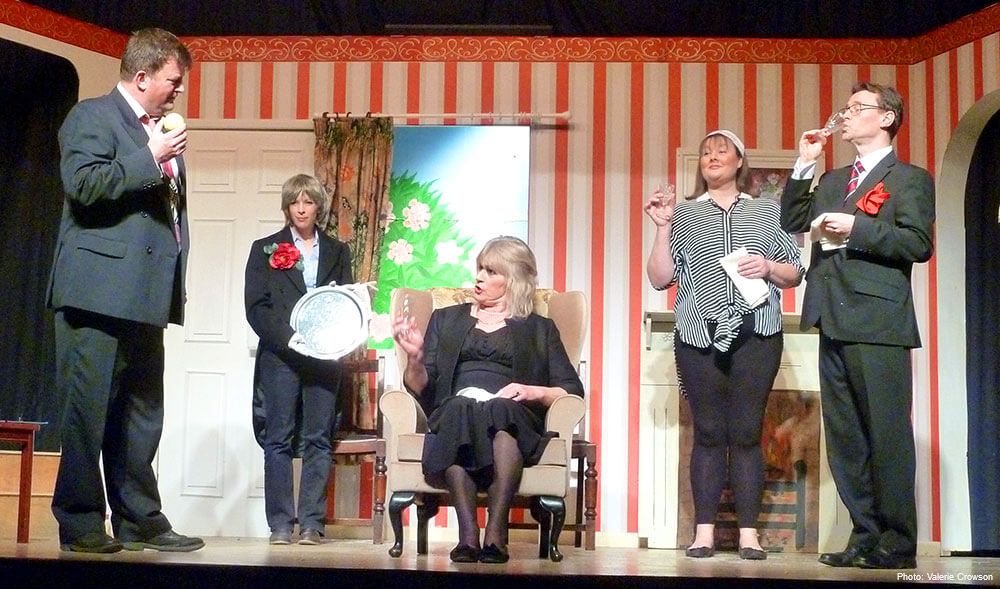
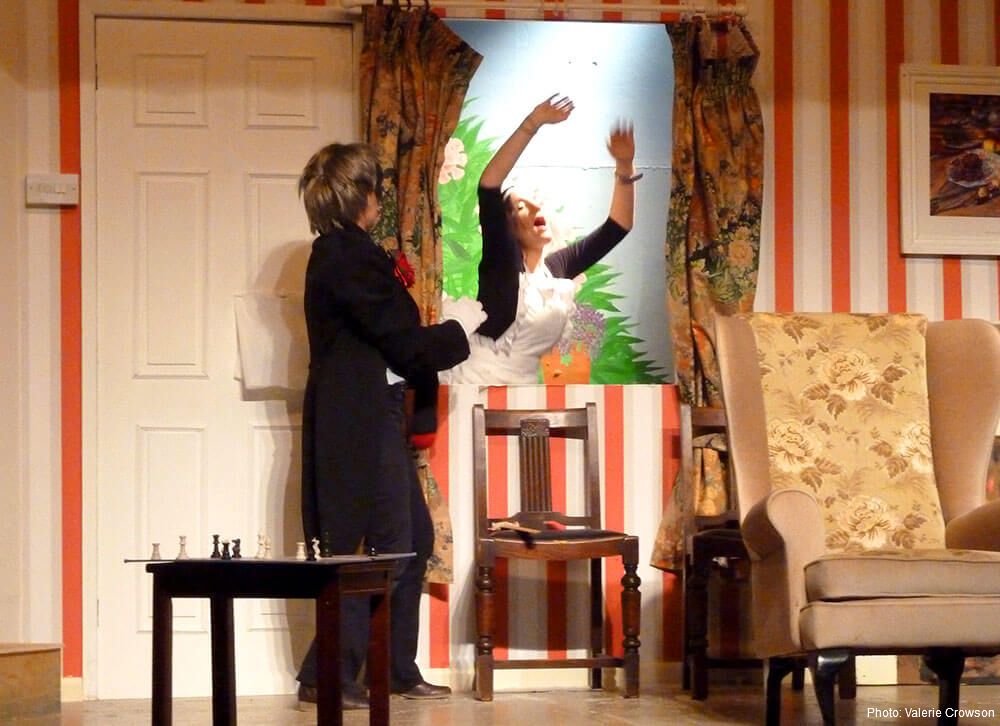
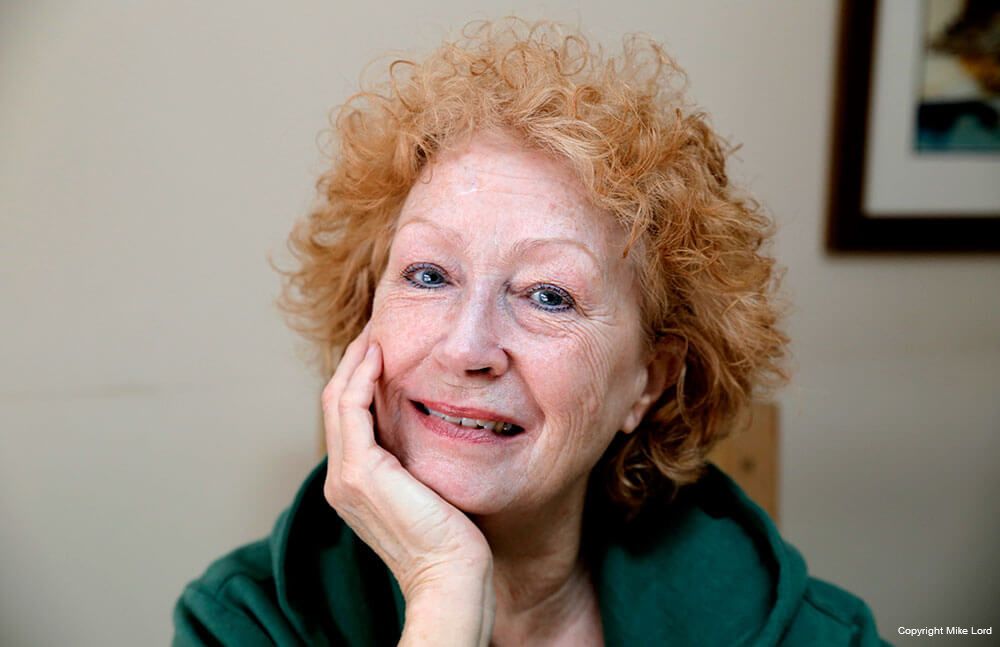
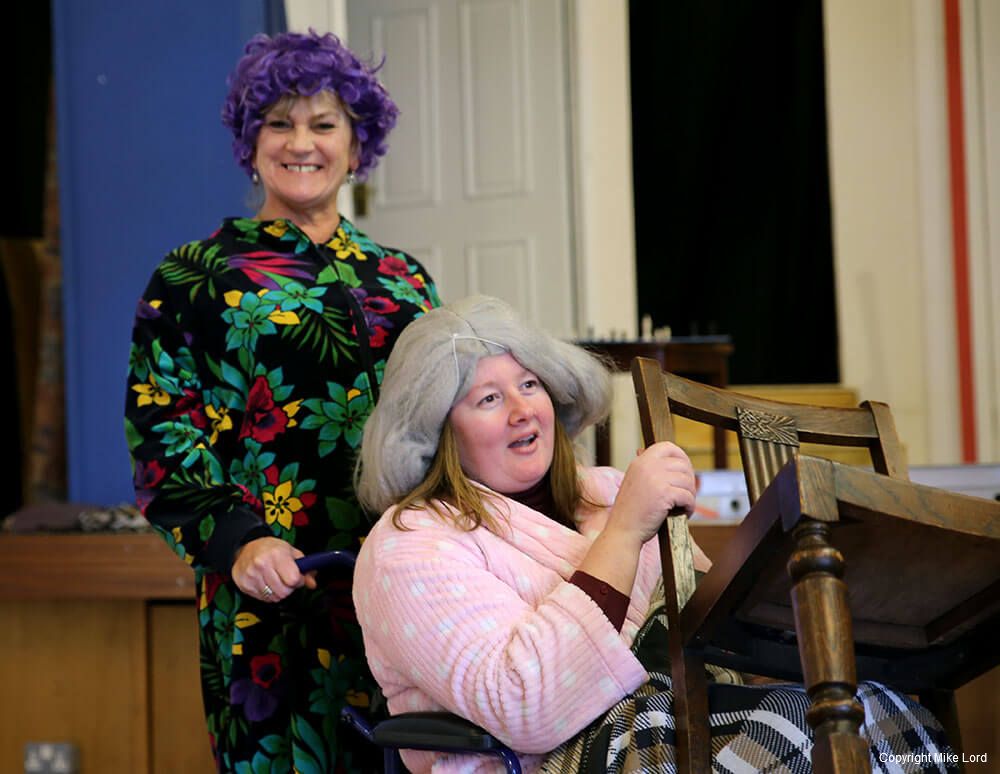
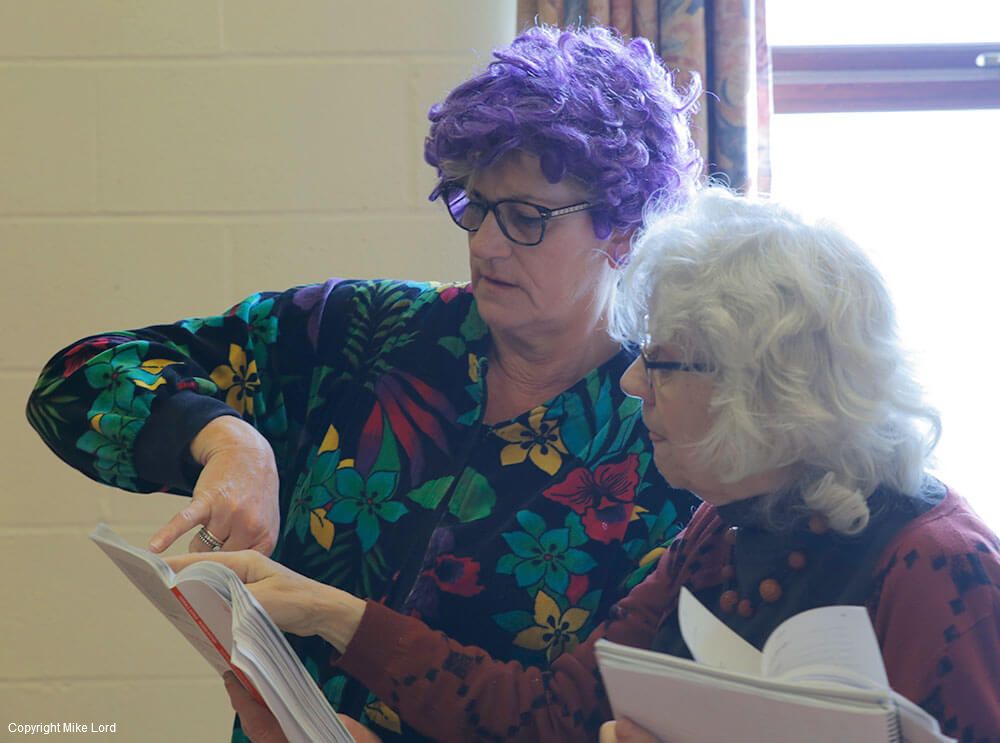
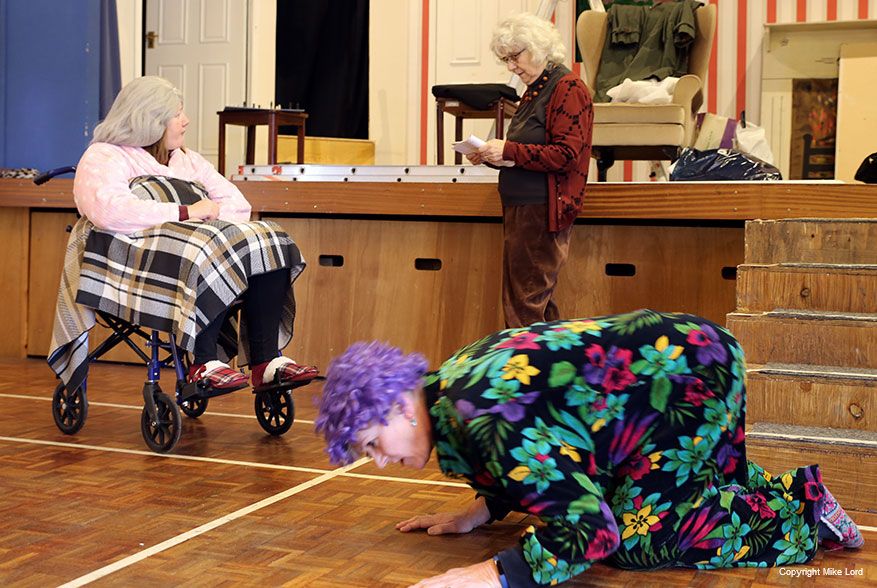
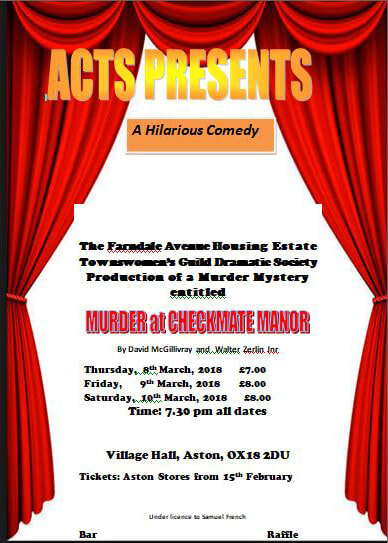
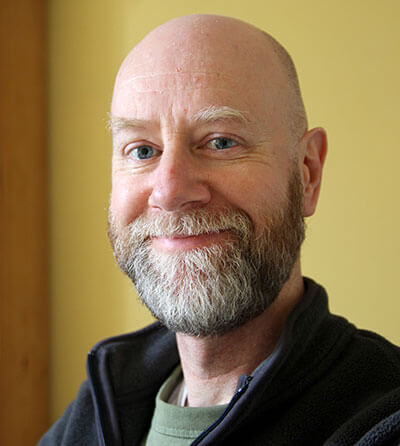
 RSS Feed
RSS Feed
